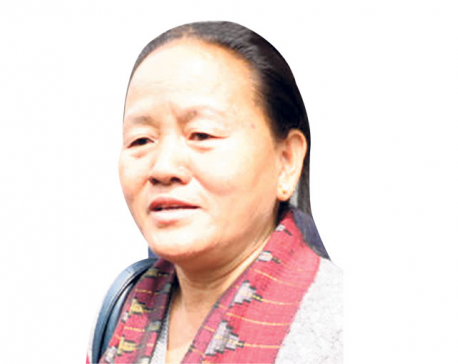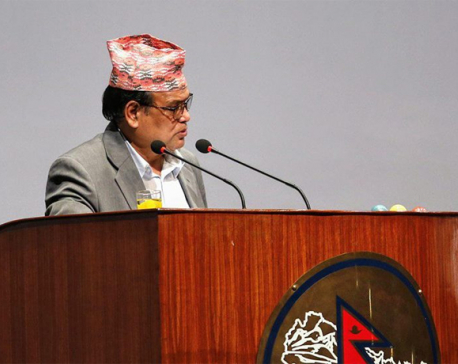
OR
With no speaker, parliament unable to do even routine work
Published On: January 2, 2020 08:27 AM NPT By: Republica | @RepublicaNepal
KATHMANDU, Jan 2: Although the parliament has commenced its winter session, it has not been able to perform routine tasks that could get done even during its prorogation, because of the lack of a speaker of the lower house.
Certification of bills that have already been endorsed, field visits by various parliamentary committees, and coordination among multiple parliamentary committees on overlapping agenda are among the activities that have been affected in the absence of a speaker, according to the parliament secretariat.
Three months have passed since the resignation of the last speaker, Krishna Bahadur Mahara, following a charge of attempted rape of an employee at the parliament secretariat.
Although the winter session, which started on December 20, was expected to initiate the election of the speaker of the lower house without further ado, the meeting of the lower house was postponed until January 12 after the ruling Nepal Communist Party (NCP) failed to finalize the choice of a candidate from the party for the post of speaker. Given the absolute majority of the NCP in parliament no other political party is in a position to elect someone as speaker.
Meanwhile, five key bills including ones concerning the adjustment of Nepal Police personnel in the federal provinces, national identity card distribution, land management and industrial enterprises were endorsed by parliament three months ago but have not yet been enacted in the absence of a speaker.
“Five bills already endorsed from parliament are awaiting a speaker for certification because we cannot forward those bills for authentication without the speaker’s signature,” said Rojnath Pandey, spokesperson at the parliament secretariat.
According to Article 113 of the constitution, the speaker or the chairperson of the house in which a bill originated has to certify it before forwarding it to the president for certification.
Similarly, field inspections and monitoring by various parliamentary committees have been completely stalled in the absence of a speaker. “The speaker has to approve the budget for the field visits of parliamentary committees and the nomination of lawmakers for the purpose,” spokesperson Pandey added.
Deputy Speaker Shiva Maya Tumbahangphe consulted the parliamentary committee heads and the parliament secretariat about these matters and they advised her that the deputy speaker cannot perform the role of speaker in the latter’s absence. Rules 175 and 182 of the parliamentary regulations make it mandatory for lawmakers to get their field visits approved by the speaker.
In the absence of a speaker, lawmakers have been embarking on foreign trips without informing the leader of their house. Two lawmakers were dragged into controversy early last year for attending an event in Europe without informing the speaker. The event they attended also happened to be a free Tibet event.
Lack of a speaker has also resulted in a lack of coordination between two or more parliamentary committees vying to deal with the same issues. At least three parliamentary committees have been holding parallel meetings on the border encroachment issue.
Deputy Speaker Tumbahangphe made recommendations for office bearers at the National Information Commission (NIC). But this was challenged in court, citing restrictive provisions in the parliamentary regulations on what a deputy speaker can do.
The winter session of parliament has not yet started its regular business as it awaits the advent of a new speaker. According to the parliament secretariat, 27 bills are pending at the lower house alone.
You May Like This

Speaker election deferred as NCP undecided over candidate
KATHMANDU, Dec 21: With the ruling Nepal Communist Party (NCP) failing to pick a candidate for speaker, the election for... Read More...

Parliament Secretariat in fix as deputy speaker can’t initiate House meetings
KATHMANDU, Nov 6: The government is planning to summon the winter session of parliament at the end of this month... Read More...

Speaker instructs officials to remove unparliamentary remarks exchanged between PM, NC lawmakers
KATHMANDU, May 10: Speaker of the Parliament Krishna Bahadur Mahara has directed the Parliament Secretariat to remove the unparliamentary remarks... Read More...





Just In
- NRB introduces cautiously flexible measures to address ongoing slowdown in various economic sectors
- Forced Covid-19 cremations: is it too late for redemption?
- NRB to provide collateral-free loans to foreign employment seekers
- NEB to publish Grade 12 results next week
- Body handover begins; Relatives remain dissatisfied with insurance, compensation amount
- NC defers its plan to join Koshi govt
- NRB to review microfinance loan interest rate
- 134 dead in floods and landslides since onset of monsoon this year












Leave A Comment